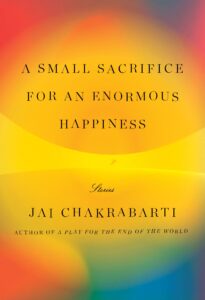
Jai Chakrabarti on Fostering Community Through Storytelling
The Author of A Small Sacrifice for an Enormous Happiness Takes the Lit Hub Questionnaire
Jai Chakrabarti’s short fiction has appeared in numerous journals and has been anthologized in The O. Henry Prize Stories, The Best American Short Stories, and awarded a Pushcart Prize. Chakrabarti was an Emerging Writer Fellow with A Public Space and received his MFA from Brooklyn College. He was born in Kolkata, India, and now splits his time between the Hudson Valley and Brooklyn, New York. His story collection, A Small Sacrifice for an Enormous Happiness, is available from Knopf.
*
Who is the person, or what is the place or practice that had the most significant impact on your writing education?
I’m deeply influenced by oral storytelling. My great uncle showed me what it was like to foster community through storytelling, and I distinctly remember the cadence and rhythm of his lines as he brought all the children of the house together and transported them into his imagined worlds. This is all to say I value the sound of sentences when they’re read aloud, and I also value the kind of storytelling that invites neighbors, friends, children to gather, which recognizes that storytelling is a conversation, that the listener (or nowadays for me, the reader) changes the outcome through their history, the sum of energies they decide to devote to the experience.
I carried this belief into my twenties as I became part of a poetry collective in NYC, the Louderarts project, which insisted on poetry both as a form that was read on the page as well as spoken aloud. I learned how to listen deeply to the rhythms of a piece, despite the clinking of glasses, the soft conversations in the back of the bar, and all the other distractions. It was a weekly meditation and a communal one at that.
What’s the best or worst writing advice you’ve ever received?
Michael Cunningham for a seminar at Brooklyn College MFA asked us to imagine that every minor character in a short story or a novel is the protagonist in some other work. I’ve always loved this sentiment because it means that we shouldn’t trivialize anyone we bring to the page and that there’s a degree of empathy and connection we should aspire to for every character. It’s advice I know has helped me avoid narrative shortcuts and forced me think more deeply about every character I invite into a story, minor or otherwise, and how they fit into the larger tapestry.
How do you tackle writer’s block?
There are a couple of practices that have helped me muddle through. The first is character journaling. I often free write in the voices of my characters; sometimes, I have them respond to probing questions. It’s all in service of arriving at a deeper understanding of who they are. I believe that as I get to know them more deeply that they’ll shine a light on where the story should go next.
Once I have a first draft, I enjoy visualizing and mapping story structures. When I was studying cognitive science, I came across the work of Barbara Tversky and her theory that spatial thinking is the foundation of all abstract thought, which in the context of story writing for me means that when I’m feeling stuck, I like to draw shapes that represent a scene or the whole story. Sometimes, the shapes help me see rifts in the structure; other times, I think they simply help me get out of a rut and allow me to envision brighter paths.
Which book(s) do you reread?
I probably go back to “old books” as much as I read anew, so here’s a condensed list: I reread To the Lighthouse for its exploration of time and its deft use of point-of-view. I reread Bleak House for its playful language and its structure. There are short stories of Rabindranath Tagore’s I reread – most especially “Kabuliwala” –in fact, I weaved versions of Tagore’s Kabuliwallah character into my own stories. I reread Munro and Malamud. I reread poems, for instance the work of Stanley Kunitz, Claudia Rankine, and Galway Kinnell.
Which of your characters is your favorite?
This changes day by day. Right now, I’m especially drawn to the character of the Kabuliwallah, who as I mentioned appears in a couple of stories in A Small Sacrifice for an Enormous Happiness. He’s a refugee, a wanderer, in some ways even a miscreant. Yet he befriends and adopts a homeless child. He opens his heart, and even as he struggles with his own poverty, he envisions a better life for himself and his adopted son. While growing up in India, I encountered versions of his story, and each version moved me. I hope readers will connect to the Kabuliwallah as they would an estranged uncle who is worthy of forgiveness and love.
_____________________________

A Small Sacrifice for an Enormous Happiness by Jai Chakrabarti is available from Knopf



















